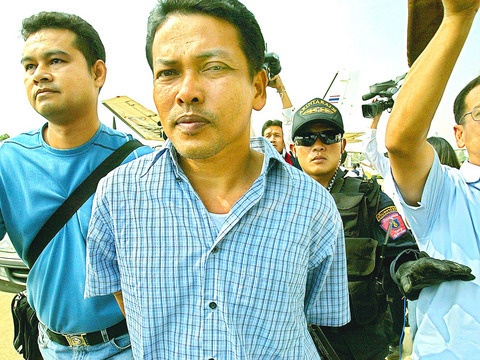Thailand's Prime Minister Thaksin Shinawatra said yesterday that two core members of a separatist insurgency in southern Thailand have fled to neighboring Malaysia where he claimed the guerrillas had received training.
But four other suspected militant leaders, captured earlier this week, were brought to Bangkok yesterday from the south to face charges of treason. All denied the charges.

PHOTO: EPA
Despite the arrests, and a hunt for 80 other key guerrilla leaders, Thaksin warned that the insurgency would persist for some time since hundreds of young men had received military training both locally at Muslim schools and in Malaysia's Kelantan State.
More than 550 people have died this year in Muslim-dominated areas of the south, many of them policemen and other officials targeted almost daily by the separatists.
"The sporadic violence will continue for some time because the movement has been brain washed and its young members have been receiving military training since 1993," Thaksin told reporters.
The prime minister said the Malaysian government was not aware of the training since it was conducted in jungle-covered areas.
"Two of the key figures fled to Malaysia and we are hunting for other core members who are divided into three groups of 22, 29 and 31," Thaksin said.
The four captured suspects, all Islamic teachers, were being transferred to Bangkok pending formal court proceedings against them, he said. They face a maximum penalty of death if found guilty.
One of the four, Wae-usoh Waedueramae, masterminded a Jan. 4 raid on an army depot in which four soldiers died and hundreds of weapons were stolen, and the torching of 36 schools in 1993, according to Thai officials.
Thai Muslims in the southern Muslim-majority provinces in this mostly Buddhist nation have long complained about unfair treatment by the central government.

Tens of thousands of Filipino Catholics yesterday twirled white cloths and chanted “Viva, viva,” as a centuries-old statue of Jesus Christ was paraded through the streets of Manila in the nation’s biggest annual religious event. The day-long procession began before dawn, with barefoot volunteers pulling the heavy carriage through narrow streets where the devout waited in hopes of touching the icon, believed to hold miraculous powers. Thousands of police were deployed to manage crowds that officials believe could number in the millions by the time the statue reaches its home in central Manila’s Quiapo church around midnight. More than 800 people had sought

DENIAL: Pyongyang said a South Korean drone filmed unspecified areas in a North Korean border town, but Seoul said it did not operate drones on the dates it cited North Korea’s military accused South Korea of flying drones across the border between the nations this week, yesterday warning that the South would face consequences for its “unpardonable hysteria.” Seoul quickly denied the accusation, but the development is likely to further dim prospects for its efforts to restore ties with Pyongyang. North Korean forces used special electronic warfare assets on Sunday to bring down a South Korean drone flying over North Korea’s border town. The drone was equipped with two cameras that filmed unspecified areas, the General Staff of the North Korean People’s Army said in a statement. South Korea infiltrated another drone

COMMUNIST ALIGNMENT: To Lam wants to combine party chief and state presidency roles, with the decision resting on the election of 200 new party delegates next week Communist Party of Vietnam General Secretary To Lam is seeking to combine his party role with the state presidency, officials said, in a move that would align Vietnam’s political structure more closely to China’s, where President Xi Jinping (習近平) heads the party and state. Next week about 1,600 delegates are to gather in Hanoi to commence a week-long communist party congress, held every five years to select new leaders and set policy goals for the single-party state. Lam, 68, bade for both top positions at a party meeting last month, seeking initial party approval ahead of the congress, three people briefed by

Cambodia’s government on Wednesday said that it had arrested and extradited to China a tycoon who has been accused of running a huge online scam operation. The Cambodian Ministry of the Interior said that Prince Holding Group chairman Chen Zhi (陳志) and two other Chinese citizens were arrested and extradited on Tuesday at the request of Chinese authorities. Chen formerly had dual nationality, but his Cambodian citizenship was revoked last month, the ministry said. US prosecutors in October last year brought conspiracy charges against Chen, alleging that he had been the mastermind behind a multinational cyberfraud network, used his other businesses to launder